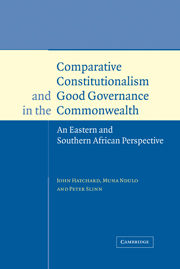 Comparative Constitutionalism and Good Governance in the Commonwealth
Comparative Constitutionalism and Good Governance in the Commonwealth Published online by Cambridge University Press: 23 June 2009
Introduction
In the Harare Commonwealth Declaration, Commonwealth Heads of Government recognised that developing appropriate ‘institutional structures which reflect national circumstances’ is a key element for promoting and protecting human rights, good governance and the rule of law. This reflects Nwabueze's warning that a major cause of the failure of constitutional government in Africa is the lack of understanding and acceptance of its principles and institutions by the populace. Institutions do not have an independent existence but survive only if they are capable of serving their society in a meaningful fashion. Therefore states must develop autochthonous oversight bodies designed to provide in practice meaningful protection to those seeking administrative justice and/or the enjoyment of their constitutional rights.
This chapter examines the organisation, functions and powers of two of the main oversight bodies, i.e. offices of the ombudsman and human rights commissions (collectively referred to as national institutions) and assesses their contribution towards furthering the aims of the Harare Commonwealth Declaration. A separate note on anti-corruption commissions is also included.
Offices of the ombudsman
The 1974 resolution of the International Bar Association sets out concisely the traditional functions of an ombudsman:
An office provided for by the constitution or by action of the legislature or parliament and headed by an independent high-level public official who is responsible to the legislature or parliament, who receives complaints from aggrieved persons [alleging maladministration] against government agencies, officials and employees or who acts on his/her own motion, and who has the power to investigate, recommend corrective action and issue reports.
To save this book to your Kindle, first ensure no-reply@cambridge.org is added to your Approved Personal Document E-mail List under your Personal Document Settings on the Manage Your Content and Devices page of your Amazon account. Then enter the ‘name’ part of your Kindle email address below. Find out more about saving to your Kindle.
Note you can select to save to either the @free.kindle.com or @kindle.com variations. ‘@free.kindle.com’ emails are free but can only be saved to your device when it is connected to wi-fi. ‘@kindle.com’ emails can be delivered even when you are not connected to wi-fi, but note that service fees apply.
Find out more about the Kindle Personal Document Service.
To save content items to your account, please confirm that you agree to abide by our usage policies. If this is the first time you use this feature, you will be asked to authorise Cambridge Core to connect with your account. Find out more about saving content to Dropbox.
To save content items to your account, please confirm that you agree to abide by our usage policies. If this is the first time you use this feature, you will be asked to authorise Cambridge Core to connect with your account. Find out more about saving content to Google Drive.